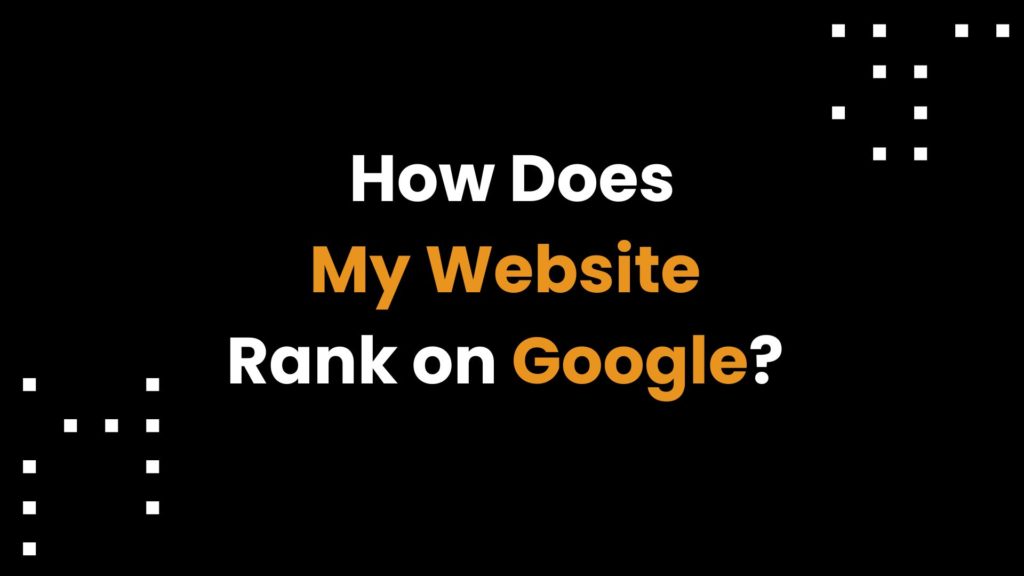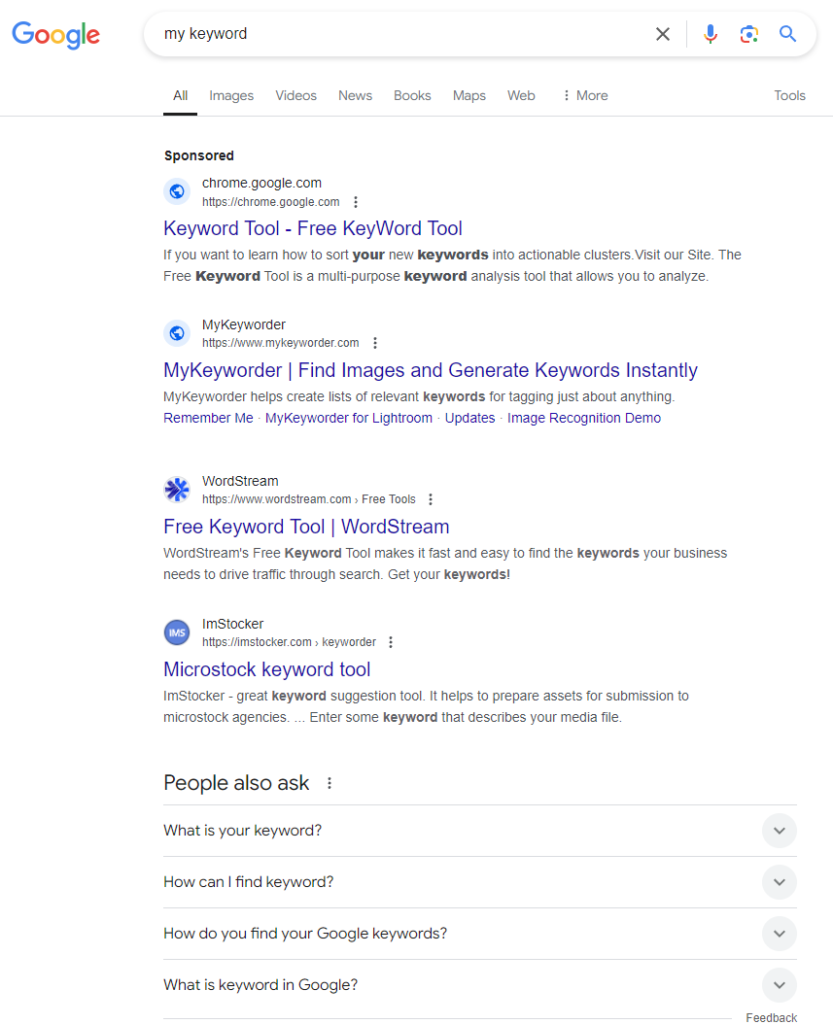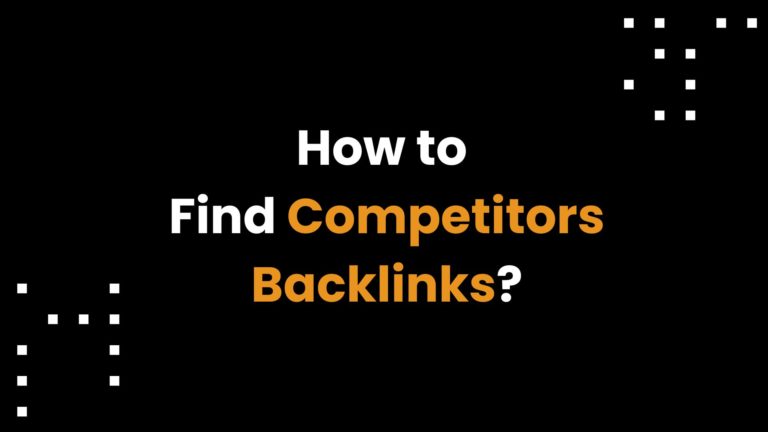Want to know how does your website rank in Google? This guide shows you how to check your rankings, offers tips to boost them, and explains the importance of search engine optimization.
Quick Facts
- Manual checking of Google rankings is easy and fast but limited in scope and accuracy due to personalized search results.
- Using Google Search Console gives you data directly from Google so you can track keywords and improve SEO.
- Paid SEO tools give you more insights and features than free tools so you can refine your SEO and improve your rankings.
- Rank tracking tools allow you to monitor your website’s rankings across multiple search engines. This is important for gaining comprehensive insights into keyword rankings and site performance, not just on Google but also on various platforms.

Check Your Google Rankings Manually
Sometimes the simplest way is the best. Manually checking your Google rankings involves typing in your target keywords into Google and seeing where your website ranks on the search engine results page (SERP). This is a quick and easy way to see how your site ranks for specific keywords and the competition. It is also important to consider the search volume of these keywords, as high search volume keywords that are low in cost-per-click can maximize visibility and attract more potential customers.

While manual checking is free and instant, it does take some effort. You can filter by keyword group to see your website’s ranking for specific keywords so you can track performance over time. Keep a spreadsheet of your keyword rankings so you can monitor changes and trends.
But there are some downsides to this.
Manual Checking Limitations
Manual checking is simple but not without flaws. It can be time consuming especially if you’re tracking multiple keywords. You can only check keywords you already know, so you might miss out on other important terms.
Personalized google search results can also skew your results so they’re not accurate and not what other users would see in google’s search results.
Use Google Search Console
Google Search Console is a must have for anyone serious about tracking their website. Setting up a Google Search Console account gives you data directly from Google so you can track your website’s presence and performance. It helps in monitoring and improving a website’s ranking by providing insights into search queries, indexing status, and potential issues affecting visibility.
Google Search Console Benefits
One of the biggest benefits of Google Search Console is its accuracy—since the data is from Google you can trust it. It’s also free to use so it’s available to all website owners. Setting up an account is easy and the insights you get will improve your SEO big time.
Unlike manual checking, Google Search Console can track thousands of keywords so you get a broader and more accurate view of your website’s ranking performance. It has valuable metrics like total clicks, impressions and average position that’s important for understanding and improving your site’s visibility in Google.
Features to Check
The ‘Search Results’ dashboard in Google Search Console is a goldmine of information. It shows you the average position of all the keywords your site ranks for so you can see your SEO performance. Select a page and click on the ‘Queries’ tab and you’ll see the keywords for that page.
Checking these metrics will give you an idea of the number of clicks and total appearances for each keyword so you can target more relevant keywords. This is important for fine tuning your SEO and getting your website to rank higher in Google.
Free Rank Checker Tools
For those on a tight budget, free rank checker tools are a great alternative to paid SEO tools. These tools allow you to check your website’s keyword rankings for free so it’s perfect for small businesses and startups. Free tools are easy to use and gives you valuable insights into your SEO.
While they may not be as in depth as paid tools, free rank checkers can still be very useful. They’ll help you understand your website’s performance and find areas to improve without spending a dime.
Free Tools
One free tool is the Keyword Rank Checker by SmallSEOTools which allows you to check your website’s rank for up to 10 keywords without registration. Another is the SERP checker from WhatsMySerp which can check the top 100 search results on Google for various keywords.

Tools like SERPROBOT checks your website’s search engine rankings in real time so you can stay updated with your SEO ranking performance. These tools are more useful for local SEO and to see your ranking position across different locations.
Free vs Paid Tools
While free SEO tools are a good starting point, they lack the data and features of paid tools. Paid tools has more reliable metrics and in-depth analysis so it’s a must have for serious SEO professionals.
If you’re just starting out with SEO, free tools are a good start. But as you grow, investing in paid tools can give you more valuable insights and more data to fine tune your SEO.
Paid SEO Tools
Investing in paid SEO tools can help you analyze and improve your website’s ranking positions better. These tools gives you a comprehensive analysis of your website’s ranking performance so you can make decisions.
Ahrefs, Moz and SEMRush are the leading paid SEO tools and each has features tailored for different SEO needs. Ahrefs is known for its backlink analysis, Moz for keyword tracking and SEMRush for competitive analysis.
Choose the right tool depending on your needs, whether it’s keyword research, site audit or competitor insights. Each of these tools has unique features that can help you rank better in Google.
Paid Tools Benefits
Paid SEO tools gives you in-depth insights of your website and competitor’s strategy so you can make data driven decisions. They usually has features like unified dashboard, detailed reports and ability to track multiple keywords.
Free tools gives you a general overview, paid tools gives you more data and features that can boost your SEO. For example, HOTH tool users can export ranking reports so they can analyze changes in keyword rankings and overall SEO performance.
How to Rank Higher in Google
Ranking higher in Google requires a combination of on-page and off-page SEO strategies. Implement these and you’ll increase your website’s visibility and organic traffic.
On-Page SEO Techniques
On-page SEO is optimizing elements within your website to make it more relevant and rank better in search engines. This includes optimizing title tags and headers which tells both users and search engines what’s in your page. Meta descriptions may not be a direct ranking factor but can affect click through rate from search results.
Using descriptive URLs and embedding high quality images with alt text can also boost your SEO. Tools like Surfer SEO can compare your content with top ranking pages and give you specific recommendations to improve.
And optimizing for ‘People Also Ask’ can drive more traffic by answering relevant questions in your content.
Off-Page SEO Strategies
Off-page SEO strategies are crucial for boosting your website’s authority and ranking in search engine results pages. Here are some effective strategies:
- Building High-Quality Backlinks: Acquiring backlinks from authoritative sites is essential to improve your site’s credibility and search engine ranking. High-quality backlinks signal to search engines that your site is a trusted source of information.
- Linkhouse Backlink Marketplace: Linkhouse offers a comprehensive platform for link building and content marketing. With access to over 74,000 websites globally, Linkhouse allows you to purchase backlinks and publish guest posts, enhancing your SEO efforts. Our marketplace provides various advertising formats, including link insertions and guest posts, which can significantly improve your SEO by increasing your site’s visibility and authority.
- Social Media Engagement: Maintaining a strong social media presence can drive traffic to your site and increase brand visibility. Engaging with users on social platforms can also lead to natural backlinks, further boosting your SEO.
- Content Marketing: Creating and distributing valuable content on other platforms can attract backlinks and increase your site’s exposure to new audiences. This approach not only enhances your SEO but also establishes your brand as an industry leader.
Combining these off-page SEO tactics, such as utilizing Linkhouse for backlinks and engaging on social media, can lead to better search rankings and more organic traffic.
Monitoring and Tweaking Your SEO
Continuous monitoring and tweaking your SEO is key to long term success. Google Search Console’s ‘Performance’ report shows you total clicks, impressions and average position for keywords so you can see how your SEO is performing.
Track your conversion rates in Google Analytics so you can adjust to improve your site. Regular site audits can uncover technical SEO issues and identify link building opportunities so your SEO strategy is always effective.
So, do you already know how to check your Google ranking?
In summary, knowing how to check your Google ranking is key to online success. From manual checks and free tools to advanced SEO strategies and paid tools, there are many ways to monitor and improve your site. Using Google Search Console and Google Analytics can give you valuable insights and help you make data driven decisions.
By applying on-page and off-page SEO, monitoring your performance and utilizing advanced SEO insights, you can rank higher in Google. Remember, SEO is a continuous process and staying updated with the latest trends and tools is key to long term success.
FAQs
How often should I check my website rankings on Google?
It’s essential to check your website rankings regularly, ideally on a weekly or monthly basis, to stay informed and make timely adjustments. Consistency is key to understanding how your keywords rank and maintaining the visibility of your website on search results pages (SERP).
Can I rely on free keyword rank checker tools to track my website’s SEO?
While free keyword rank checker tools are a good starting point, relying solely on them might not provide comprehensive insights into your website’s performance. Paid tools offer more in-depth data about your website, including keyword ranking and SERP features, which can help you rank higher on Google.
What should I track in Google Search Console to improve my website rank?
In Google Search Console, focus on tracking total clicks, impressions, average position, and search queries. These metrics give you valuable data about your website’s performance in Google’s ranking system. Monitoring how your keywords rank and the visibility of specific pages will help you optimize for better search results.
How can I optimize on-page SEO to rank higher on Google?
To optimize on-page SEO and rank higher on Google, ensure you’re using well-structured title tags and meta descriptions. Incorporate high-quality images with alt text, and make sure your site’s URL structure is clear and descriptive. Additionally, optimizing for mobile devices and enhancing content on your website will improve the overall user experience and help search engines rank your pages better.
What role do backlinks play in improving off-page SEO and my rankings on Google?
Backlinks are crucial for off-page SEO as they signal to Google that your site is a trusted source of information. High-quality backlinks from reputable websites can significantly improve your rankings in Google search. They contribute to the authority and credibility of your content, which are essential for ranking purposes and appearing higher in search results. Want to start link building campaign? Try Linkhouse!








